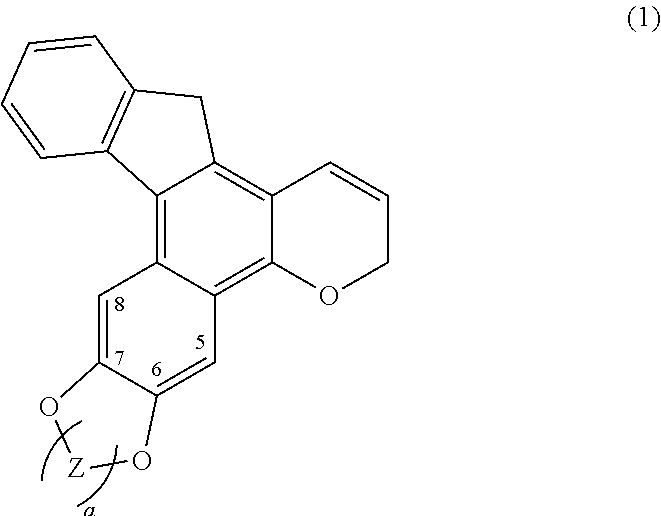Chromene compound
a chromene compound and compound technology, applied in the field of chromene compound, can solve the problems of generally inferior durability of photochromic compound and yellow color, and achieve the effects of reducing fading speed, increasing electron donation ability, and enhancing the double peak characteristic of chromene compound having an indenonaphthopyran skeleton
- Summary
- Abstract
- Description
- Claims
- Application Information
AI Technical Summary
Benefits of technology
Problems solved by technology
Method used
Image
Examples
example 1
[0100]1.00 g (2.33 mmol) of a naphthol compound represented by the following formula (15) and 0.92 g (3.43 mmol) of a propargyl alcohol compound represented by the following formula (16) were dissolved in 50 ml of toluene, 0.022 g of p-toluenesulfonic acid was further added to the resulting solution, and the obtained mixture was refluxed for 1 hour.
After the reaction, the solvent was removed, the obtained product was purified by column chromatography, and crystallization was carried out with methanol (5 ml) to obtain 1.11 g of a white powder (yield rate of 70%). The elemental analysis values of this product were 79.44% of C, 6.49% of H and 0.00% of N which were almost equal to the calculated values of C45H44O6 (C, 79.39%, H, 6.51%, N, 0.00%).
[0101]When the proton nuclear magnetic resonance spectrum of the product was measured, it showed 28H peaks based on an alkyl group and an alkoxy group at δ of around 0.5 to 4.5 ppm and a 16H peak based on an aromatic proton at δ of around 5.0 to...
examples 2 and 3
[0104]Chromene compounds shown in Table 1 were synthesized in the same manner as in Example 1. When the structures of the obtained products were analyzed by using the same structure confirming means as in Example 1, it was confirmed that they were compounds represented by structural formulas shown in Table 1. The elemental analysis values, calculated values obtained from the structural formulas of the compounds and characteristic 1H-NMR spectra of these compounds are shown in Table 2.
TABLE 1Ex-Raw materialsam-PropargylYieldpleNaphtholalcoholrateNo.derivativederivativeProduct(%)265367
TABLE 2Elemental analysis valuesExperimentalCalculated Compoundvaluesvalues 1H-NMRNo.CHNCHN(NMR)272.665.771.8072.765.721.81δ5.0-9.029Hδ0.5-4.529H377.896.770.0077.886.670.00δ5.0-9.032Hδ0.5-4.532H
example 4
Evaluation of Physical Properties of Photochromic Plastic Lens Produced by Coating Method
[0105]The chromene compound obtained in Example 1 was mixed with a photopolymerization initiator and polymerizable monomers, the resulting mixture was applied to the surface of a lens substrate, and ultraviolet light was applied to polymerize the coating film on the surface of the lens substrate.
[0106]For a photochromic curable composition, a mixture of 50 parts by mass of 2,2-bis(4-methacryloyloxypentaethoxyphenyl)propane, 10 parts by mass of polyethylene glycol diacrylate (average molecular weight of 532), 10 parts by mass of trimethylolpropane trimethacrylate, 10 parts by mass of polyester oligomer hexaacrylate (EB-1830 of Daicel UCB Co., Ltd.) and 10 parts by mass of glycidyl methacrylate as radical polymerizable monomers was used. 1 part by mass of the chromene compound obtained in Example 1 was added to and fully mixed with 90 parts by mass of this mixture of the radical polymerizable mono...
PUM
| Property | Measurement | Unit |
|---|---|---|
| absorption wavelength | aaaaa | aaaaa |
| absorption wavelength | aaaaa | aaaaa |
| color optical density | aaaaa | aaaaa |
Abstract
Description
Claims
Application Information
 Login to View More
Login to View More - R&D
- Intellectual Property
- Life Sciences
- Materials
- Tech Scout
- Unparalleled Data Quality
- Higher Quality Content
- 60% Fewer Hallucinations
Browse by: Latest US Patents, China's latest patents, Technical Efficacy Thesaurus, Application Domain, Technology Topic, Popular Technical Reports.
© 2025 PatSnap. All rights reserved.Legal|Privacy policy|Modern Slavery Act Transparency Statement|Sitemap|About US| Contact US: help@patsnap.com



